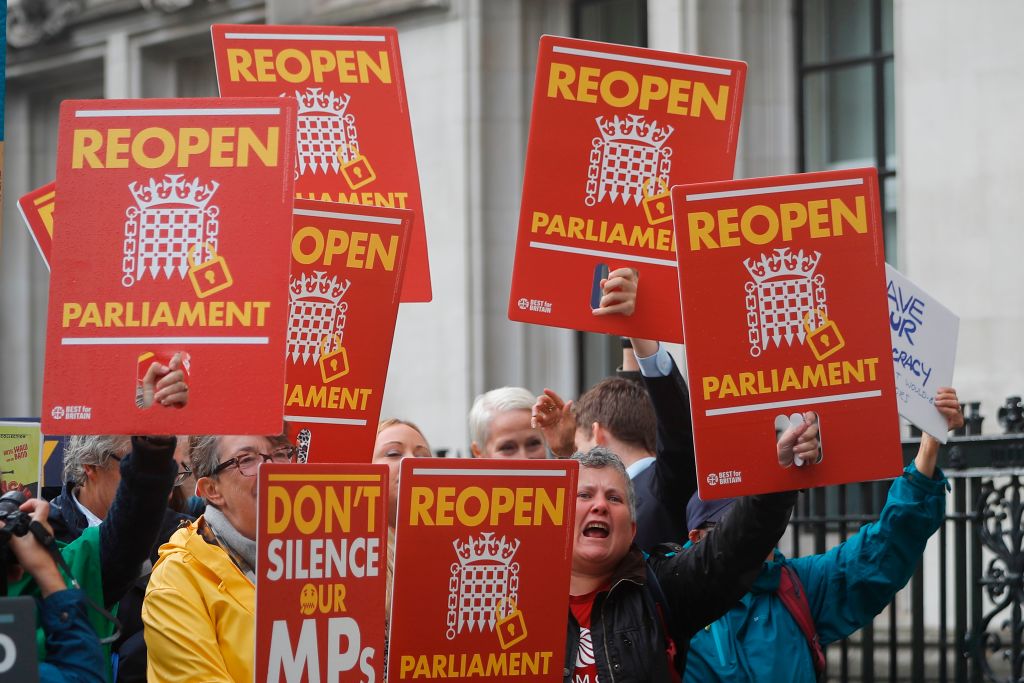Britain's high court rules Boris Johnson's suspension of Parliament unlawful, 'void, and of no effect'


A free daily email with the biggest news stories of the day – and the best features from TheWeek.com
You are now subscribed
Your newsletter sign-up was successful
In a historic decision Tuesday, Britain's Supreme Court ruled that Prime Minister Boris Johnson's suspension of Parliament was unlawful. Johnson said he suspended, or prorogued, Parliament for five weeks ahead of the Brexit deadline to allow a routine Queen's Speech to lay out his policies. The court's 11 justices ruled unanimously that Johnson had acted outside the law, the decision to suspend Parliament is "void and of no effect," meaning Parliament was never prorogued, and the speakers of the House of Commons and House of Lords will have to decide what to do next.
Commons Speaker John Bercow said Parliament "must convene without delay" and he will consult with party leaders "as a matter of urgency."
The suspension "was unlawful because it had the effect of frustrating or preventing the ability of Parliament to carry out its constitutional functions without reasonable justification," said Lady Brenda Hale, the court's president. "In this nation without a written constitution, the case marked a rare confrontation between the prime minister, the courts, and Parliament over their rights and responsibilities," The Associated Press reports. Johnson, in New York for the United Nations General Assembly, has not said whether he will resign if the high court ruled against him, or perhaps try to prorogue Parliament again. His office said it is "currently processing the verdict."
The Week
Escape your echo chamber. Get the facts behind the news, plus analysis from multiple perspectives.

Sign up for The Week's Free Newsletters
From our morning news briefing to a weekly Good News Newsletter, get the best of The Week delivered directly to your inbox.
From our morning news briefing to a weekly Good News Newsletter, get the best of The Week delivered directly to your inbox.
"Wow! This is legal, constitutional, and political dynamite," writes BBC legal affairs correspondent Clive Coleman. "The court may have fallen short of saying Boris Johnson had an improper motive of stymieing or frustrating parliamentary scrutiny, but the damage is done, he has been found to have acted unlawfully and stopped Parliament from doing its job without any legal justification. ... Be you ever so mighty, the law is above you — even if you are the prime minister."
A free daily email with the biggest news stories of the day – and the best features from TheWeek.com
Peter has worked as a news and culture writer and editor at The Week since the site's launch in 2008. He covers politics, world affairs, religion and cultural currents. His journalism career began as a copy editor at a financial newswire and has included editorial positions at The New York Times Magazine, Facts on File, and Oregon State University.
-
 Political cartoons for February 21
Political cartoons for February 21Cartoons Saturday’s political cartoons include consequences, secrets, and more
-
 Crisis in Cuba: a ‘golden opportunity’ for Washington?
Crisis in Cuba: a ‘golden opportunity’ for Washington?Talking Point The Trump administration is applying the pressure, and with Latin America swinging to the right, Havana is becoming more ‘politically isolated’
-
 5 thoroughly redacted cartoons about Pam Bondi protecting predators
5 thoroughly redacted cartoons about Pam Bondi protecting predatorsCartoons Artists take on the real victim, types of protection, and more
-
 ABC News to pay $15M in Trump defamation suit
ABC News to pay $15M in Trump defamation suitSpeed Read The lawsuit stemmed from George Stephanopoulos' on-air assertion that Trump was found liable for raping writer E. Jean Carroll
-
 Judge blocks Louisiana 10 Commandments law
Judge blocks Louisiana 10 Commandments lawSpeed Read U.S. District Judge John deGravelles ruled that a law ordering schools to display the Ten Commandments in classrooms was unconstitutional
-
 ATF finalizes rule to close 'gun show loophole'
ATF finalizes rule to close 'gun show loophole'Speed Read Biden moves to expand background checks for gun buyers
-
 Hong Kong passes tough new security law
Hong Kong passes tough new security lawSpeed Read It will allow the government to further suppress all forms of dissent
-
 France enshrines abortion rights in constitution
France enshrines abortion rights in constitutionspeed read It became the first country to make abortion a constitutional right
-
 Texas executes man despite contested evidence
Texas executes man despite contested evidenceSpeed Read Texas rejected calls for a rehearing of Ivan Cantu's case amid recanted testimony and allegations of suppressed exculpatory evidence
-
 Supreme Court wary of state social media regulations
Supreme Court wary of state social media regulationsSpeed Read A majority of justices appeared skeptical that Texas and Florida were lawfully protecting the free speech rights of users
-
 Greece legalizes same-sex marriage
Greece legalizes same-sex marriageSpeed Read Greece becomes the first Orthodox Christian country to enshrine marriage equality in law
